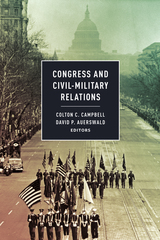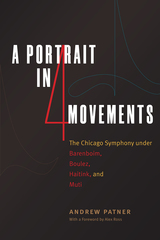
While the president is the commander in chief, the US Congress plays a critical and underappreciated role in civil-military relations—the relationship between the armed forces and the civilian leadership that commands it. This unique book edited by Colton C. Campbell and David P. Auerswald will help readers better understand the role of Congress in military affairs and national and international security policy. Contributors include the most experienced scholars in the field as well as practitioners and innovative new voices, all delving into the ways Congress attempts to direct the military.
This book explores four tools in particular that play a key role in congressional action: the selection of military officers, delegation of authority to the military, oversight of the military branches, and the establishment of incentives—both positive and negative—to encourage appropriate military behavior. The contributors explore the obstacles and pressures faced by legislators including the necessity of balancing national concerns and local interests, partisan and intraparty differences, budgetary constraints, the military's traditional resistance to change, and an ongoing lack of foreign policy consensus at the national level. Yet, despite the considerable barriers, Congress influences policy on everything from closing bases to drone warfare to acquisitions.
A groundbreaking study, Congress and Civil-Military Relations points the way forward in analyzing an overlooked yet fundamental government relationship.

The Chicago Symphony Orchestra has been led by a storied group of conductors. And from 1994 to 2015, through the best work of Daniel Barenboim, Pierre Boulez, Bernard Haitink, and Riccardo Muti, Andrew Patner was right there. As a classical music critic for the Chicago Sun-Times and WFMT radio, Patner was able to trace the arc of the CSO’s changing repertories, all while cultivating a deep rapport with its four principal conductors.
This book assembles Patner’s reviews of the concerts given by the CSO during this time, as well as transcripts of his remarkable radio interviews with these colossal figures. These pages hold tidbits for the curious, such as Patner’s “driving survey” that playfully ranks the Maestri he knew on a scale of “total comfort” to “fright level five,” and the observation that Muti appears to be a southpaw on the baseball field. Moving easily between registers, they also open revealing windows onto the sometimes difficult pasts that brought these conductors to music in the first place, including Boulez’s and Haitink’s heartbreaking experiences of Nazi occupation in their native countries as children. Throughout, these reviews and interviews are threaded together with insights about the power of music and the techniques behind it—from the conductors’ varied approaches to research, preparing scores, and interacting with other musicians, to how the sound and personality of the orchestra evolved over time, to the ways that we can all learn to listen better and hear more in the music we love. Featuring a foreword by fellow critic Alex Ross on the ethos and humor that informed Patner’s writing, as well as an introduction and extensive historical commentary by musicologist Douglas W. Shadle, this book offers a rich portrait of the musical life of Chicago through the eyes and ears of one of its most beloved critics.
READERS
Browse our collection.
PUBLISHERS
See BiblioVault's publisher services.
STUDENT SERVICES
Files for college accessibility offices.
UChicago Accessibility Resources
home | accessibility | search | about | contact us
BiblioVault ® 2001 - 2024
The University of Chicago Press









